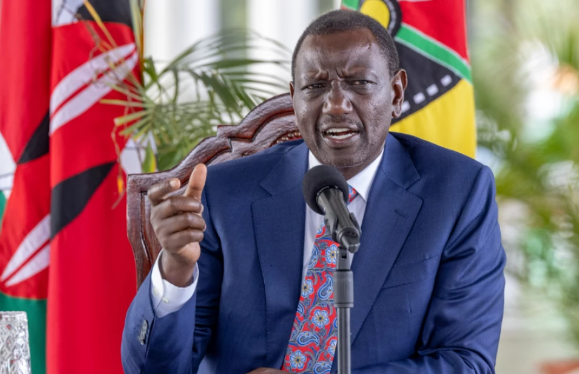President William Ruto has justified the government’s proposal to impose extra taxes on Kenyans, arguing that it forms a crucial part of a broader strategy aimed at boosting the nation’s revenue and reducing dependence on borrowing. Ruto has outlined his intention to elevate the country’s average tax rate from the current 14 percent to 16 percent by the year’s end, with a further goal of reaching a rate between 20 and 22 percent by the conclusion of his term in office. While acknowledging the immediate economic strain that such measures may impose on citizens, Ruto remains confident that the long-term advantages will outweigh the burden of increased taxation.
“My drive is to push Kenya, possibly this year we will be at 16% from 14%. I want in my term, God willing, to leave it at between 20 and 22 %. It’s going to be difficult, I have a lot of explaining to do, people will complain but I know finally they will appreciate that the money we go to borrow from the World Bank is savings from other countries,” said Ruto.
He made these remarks while addressing the Harvard Business School’s Class of 2025 students on Africa’s trade and investment prospects at State House, Nairobi, on Tuesday. President Ruto highlighted that the effort to increase revenue through taxation was also aimed at ensuring fiscal responsibility and living within the country’s means.
“When I came into office I told everybody to tighten up your belts… I am not going to preside over a bankrupt country… I’m not going to preside over a country in debt distress. We have to cut our spending. And there is no free lunch,” he said, further dismissing the perception that Kenya has higher taxes compared to the region.
“…Kenyans have been socialised to believe that they pay the highest taxes but empirical data shows that as of last year, our tax as a percentage of our revenues was 14 %. Our peers in the continent are on an average of between 22 and 25 per cent which means our taxes are way below those of our peers,” said President Ruto.
He added: “And I’m not comparing ourselves with OECD countries. Countries like France are at 45% others are higher. So I persuaded and made a case to the people of Kenya that we must begin to enhance our revenue because if we are a serious state we must be able to enhance our taxes.”
President Ruto’s statements come at a time when sweeping changes to Kenya’s Value Added Tax (VAT) system are being proposed, potentially impacting millions of Kenyan consumers. Among these changes is the proposed increase in the price of bread and the introduction of a mandatory tax for all motor vehicle owners, aimed at funding the 2024-2025 budget.
The Treasury has recommended applying VAT to bread, proposing a rate of 16 percent after removing bread from tax exemption. Additionally, the Finance Bill 2024 proposes eliminating VAT exemptions for various financial services, including issuing credit and debit cards, telegraphic money transfer services, and cheque handling, processing, clearing, and settlement, including special clearance or cancellation of cheques.



